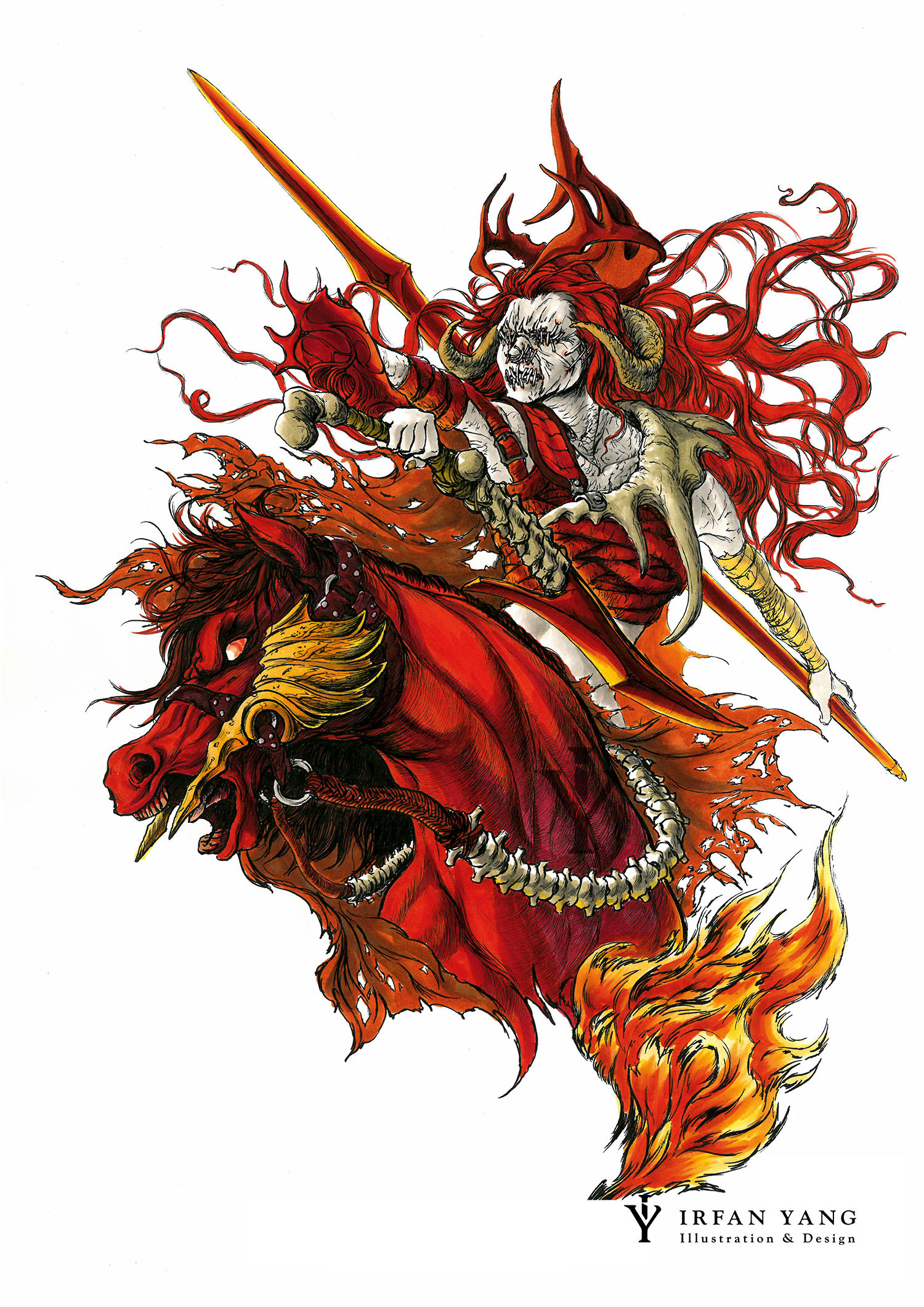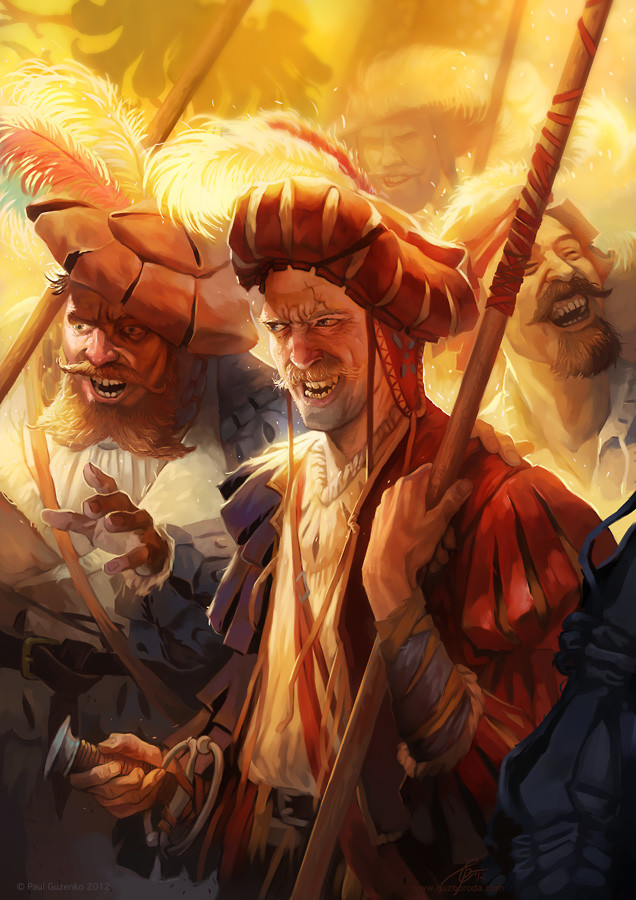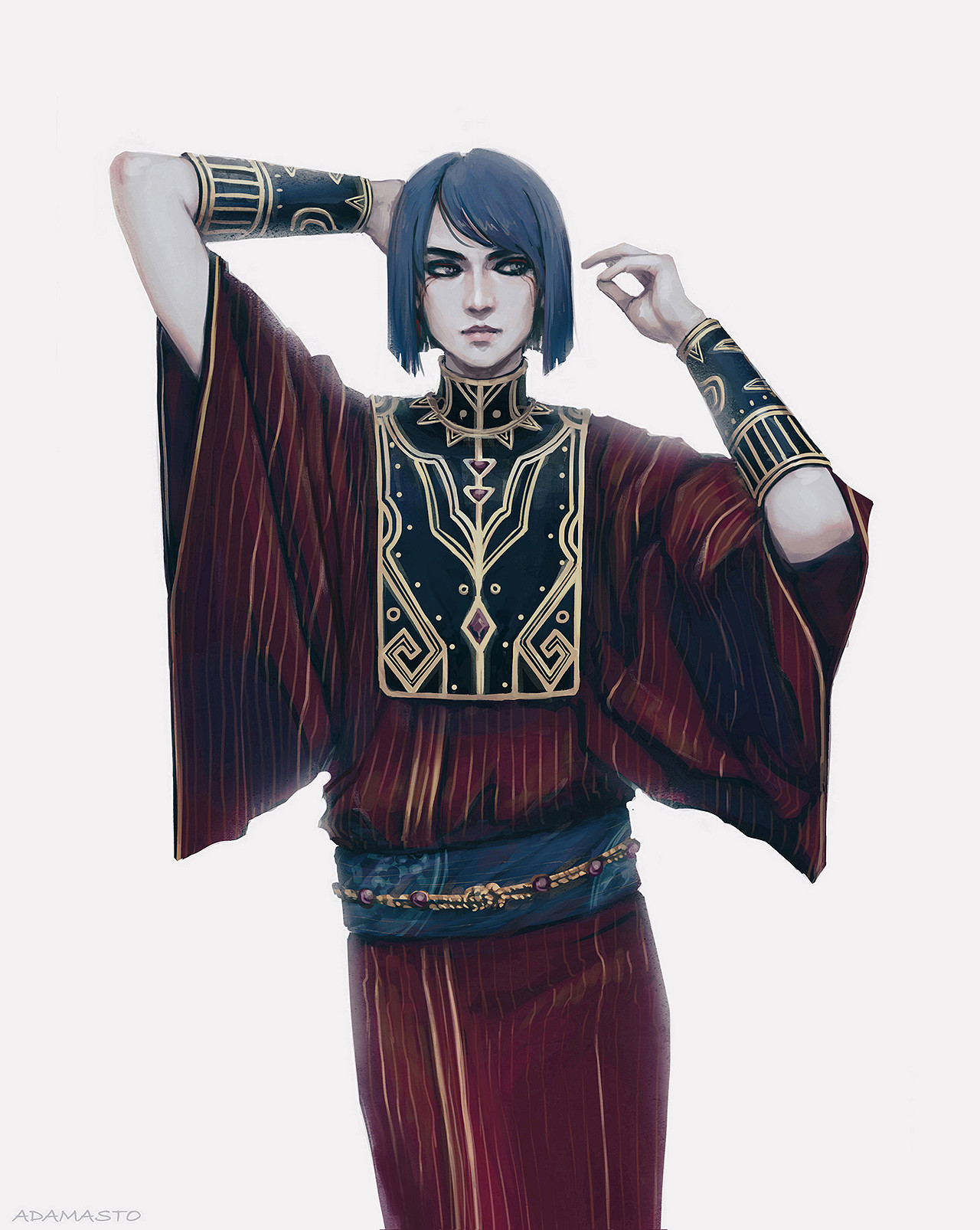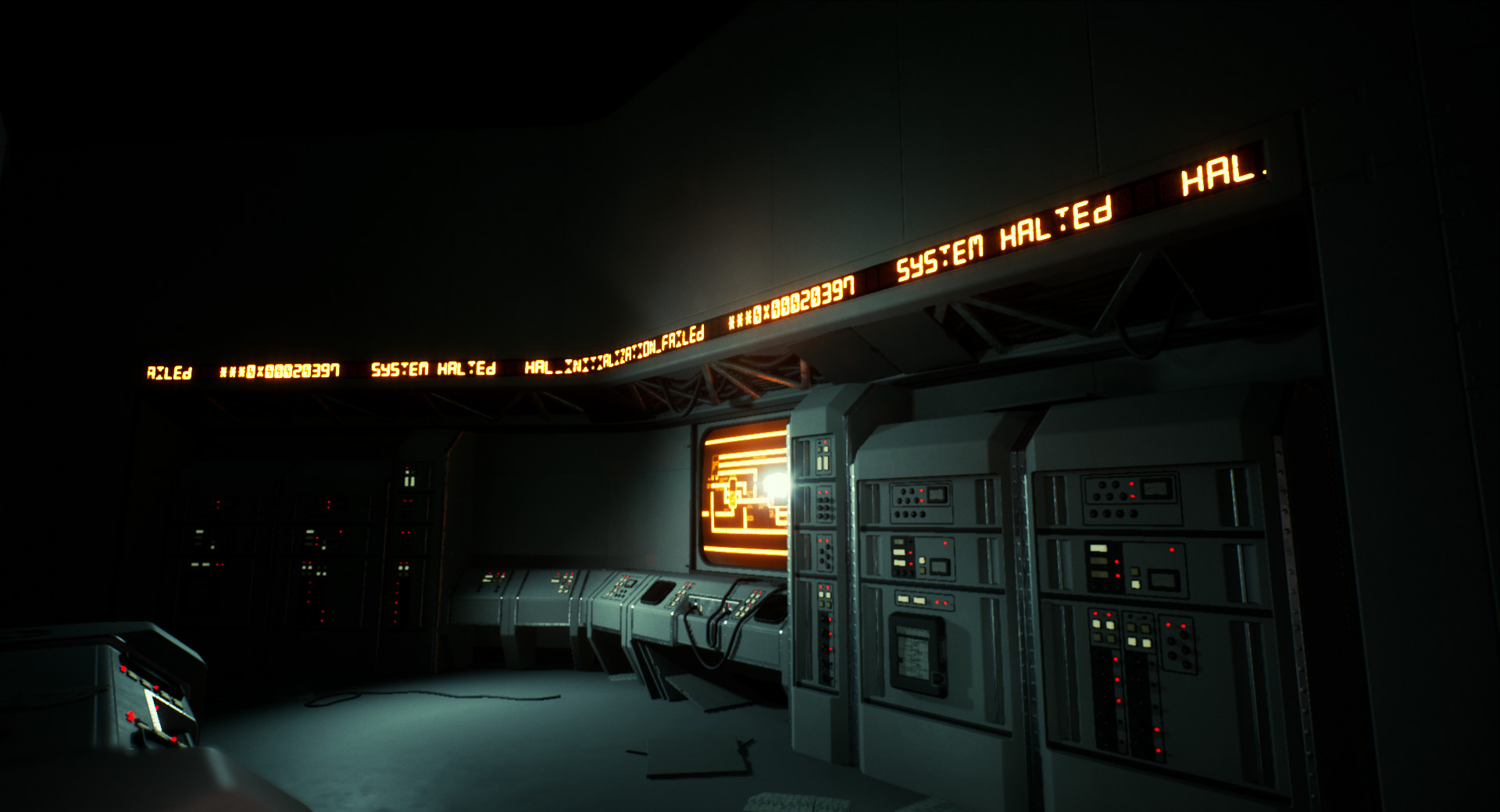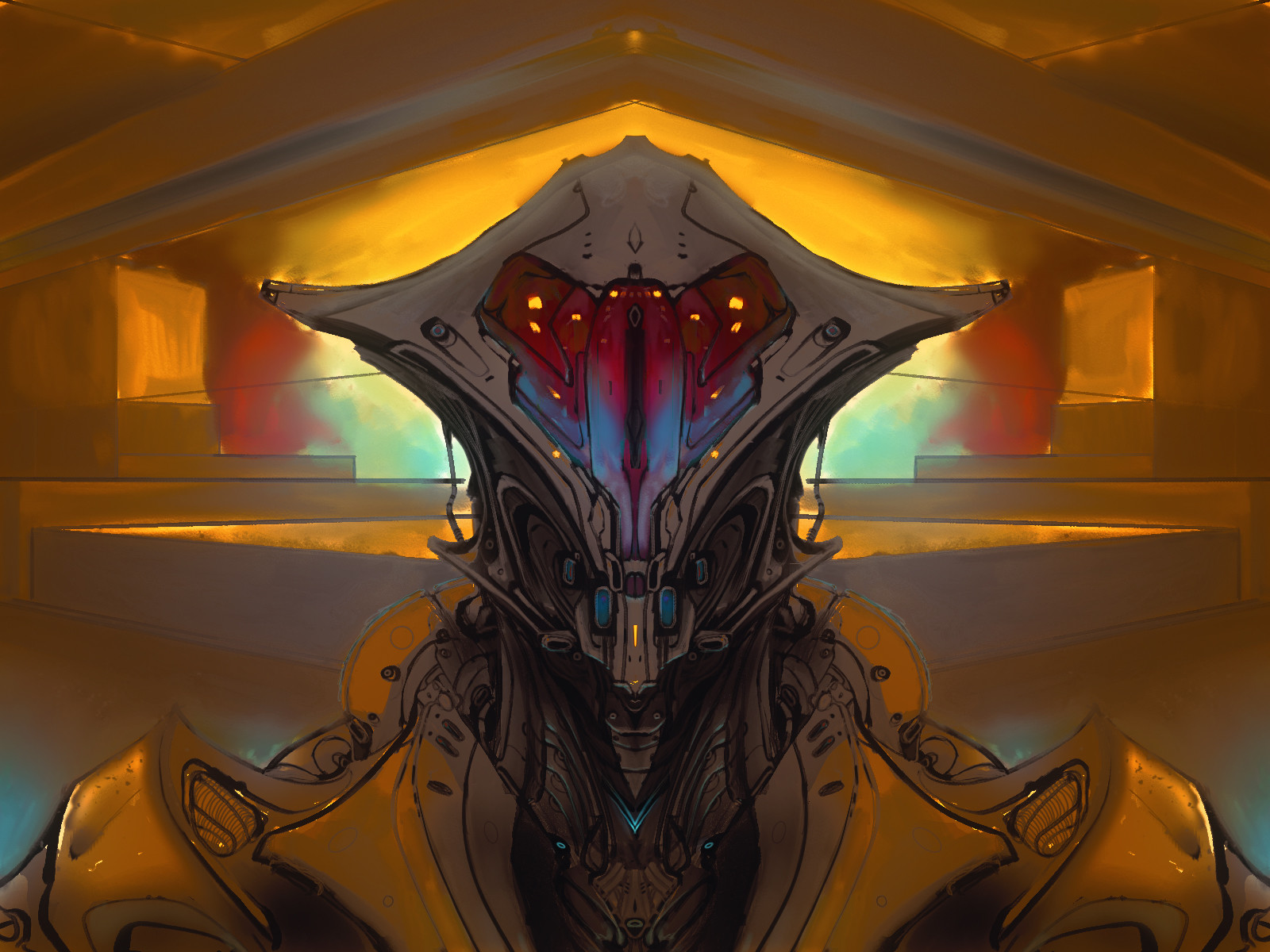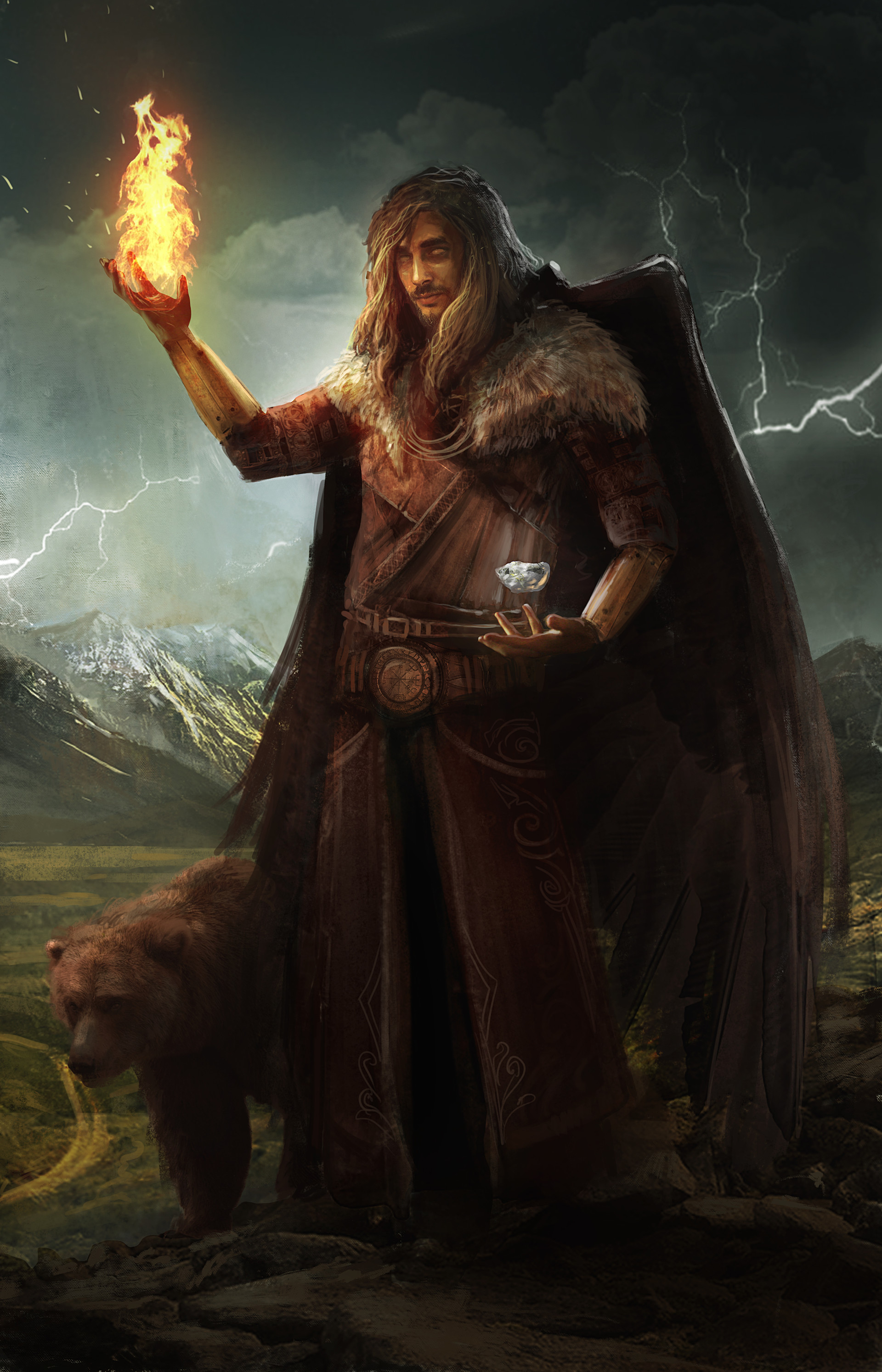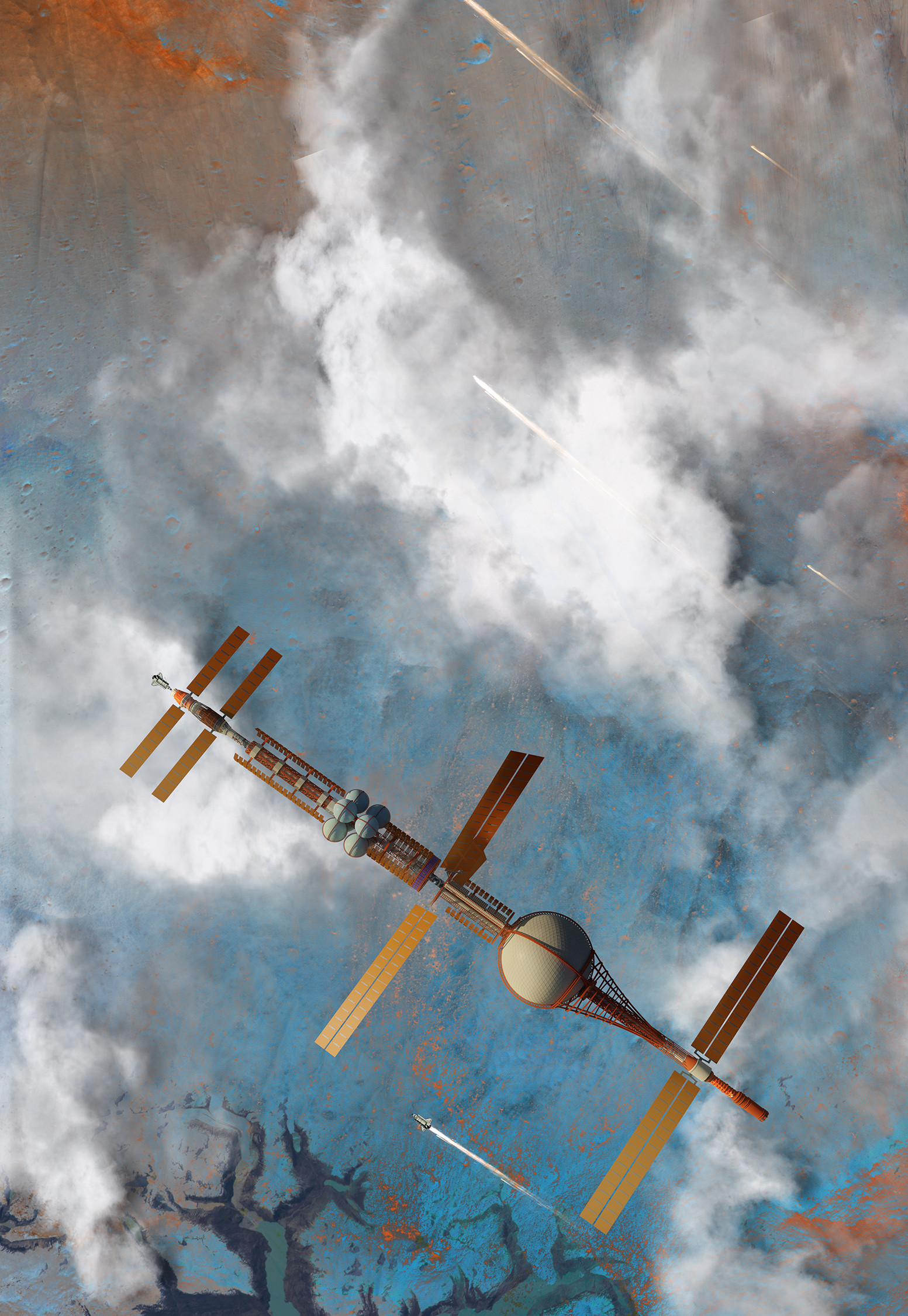"And always must you disdain and shun such disreputable knaves as gravediggers, tanners and the barber-surgeons..." - Morkan, Head Physician of the Corpus Collegium
I'm on a roll with the healer-type classes.
The Moderati flaunt their magical talents as they knit flesh and draw poison with a touch, physicians consult their tomes and watch the stars to source their cures, and priests pray for the sick amidst finery and wonder. You, on the other hand, know the honest trade of flesh, blood, and bone.
Barber-surgeons are what happens when an educated and wealthy elite don't want to get their hands dirty with actual medicine. They are medical jacks-of-all-trades, able to pull teeth, amputate limbs, draw blood, make 'medicines', cut hair and remove bladder stones. Sometimes the tender ministrations of a barber-surgeon can cause more trouble for their patient than the patient's ailments. They do not have the privilege of a university education, instead learning their trade as an apprentice.
Many cast off the lives they had in the cities and towns, or as itinerant surgeons wandering between villages, and found lucrative employment treating soldiers fighting in the War. While most barber-surgeons know little of violence besides the occasional brutality they visit out of necessity on their patients, this class represents a battlefield surgeon driven weary by the horrors they encounter - a Sawbones.
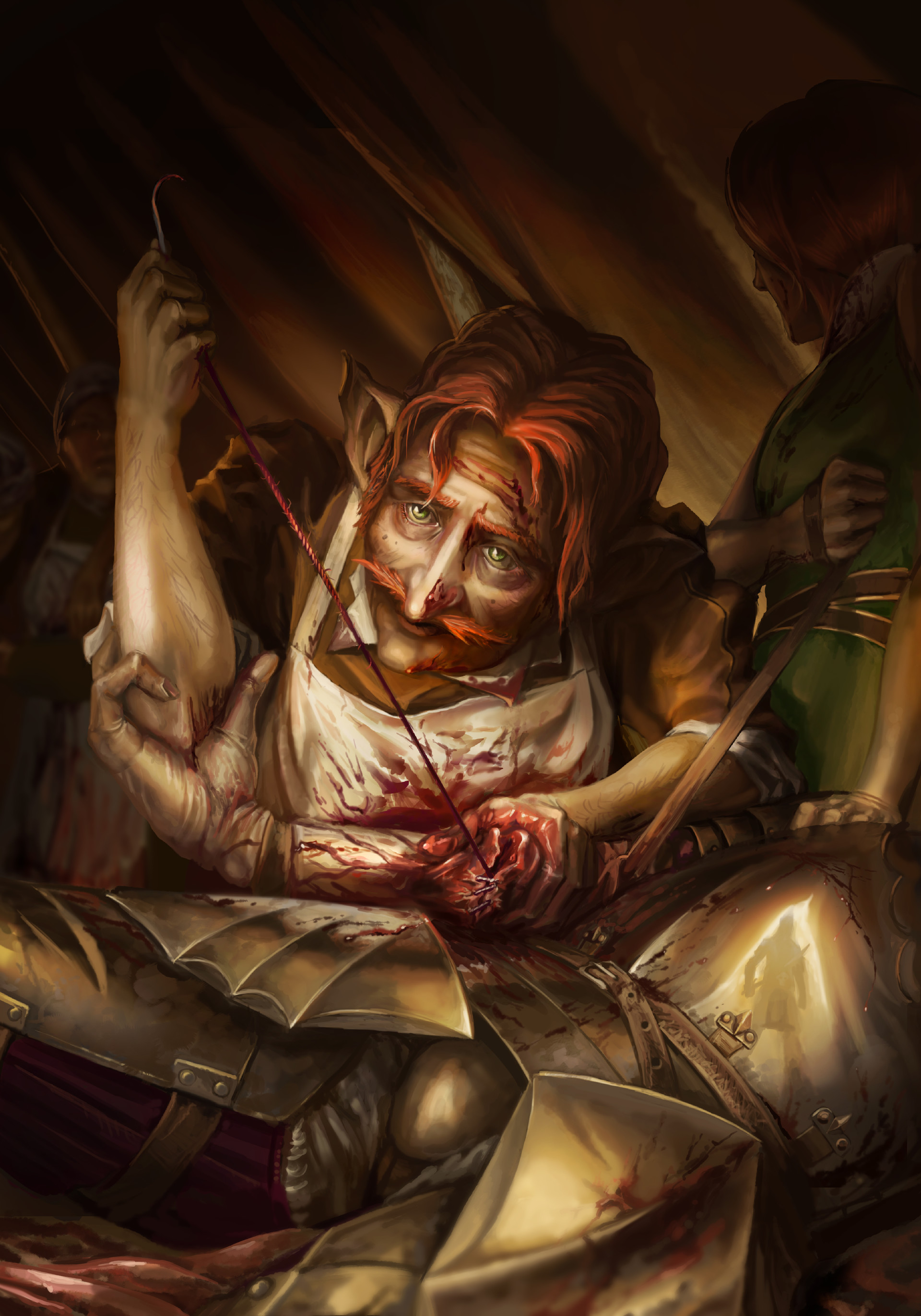 |
| Credit, Jakub Dobi |
Sawbones
Starting Equipment: dagger, medical supplies (3), leather apron, 1d6sp.
Medical supplies are used to fuel some of your abilities and represent assorted poultices, vials of alchemical ingredients, leeches, stitches, smelling salts and other tools of your trade. You can carry up to 3 in a single Inventory Slot and can purchase them for 1gp in any town or city. Villages may have them but they will be much more expensive.
A: Crude Poultice; Leech.
B: Find Vein; Vapours.
C: Stimulant.
D: Radical Treatment.
You gain +1 to Saves vs Fear and Disease for each Sawbones template you possess.
Crude Poultice
You fashion a quick and dirty salve for your target's wounds, healing them for 1d3+X HP, where X = the number of Sawbones templates you possess. This costs 1 use of medical supplies. If used to heal an injury, this ability reduces the injury length by (1d3 + X)/2 days.
Leech
You affix leeches to the target's flesh, purifying their blood. They may make a new Save vs all poisons, diseases or intoxicating effects with 1 Boon. This costs 1 use of medical supplies.
Find Vein
Once per day per level, you may rupture a major blood vessel on a successful attack with a bladed or piercing weapon. The target takes 1d6 damage at the start of their turn until the bleeding is stemmed. This only affects living targets. You can declare this after an attack roll has been made.
Vapours
You waft a vial or rag saturated with noxious substances under the target's nose, removing 1d6/level points of Shock from them. This costs 1 use of medical supplies.
Stimulant
You fashion a stimulant cocktail that increases the target's STR and Movement by 4 for 1d6 Rounds. Once the effect expires the target suffers 1d6 damage, their STR is reduced by 2 and they must Save vs CON or gain an amount of Shock equal to their CON. This costs 2 uses of medical supplies.
Radical Treatment
You undertake a desperate treatment deemed to be insane by your more orthodox peers, but the circumstances demand it. Instead of rolling INT/2 to stabilise a character with Fatal Wounds, expend 3 uses of medical supplies. The check automatically passes and the character survives, but not intact. The GM has discretion over what this entails, but something along these lines is generally in the right ballpark. The character gains an Interesting Scar.
You gain +1 to Saves vs Fear and Disease for each Sawbones template you possess.
Crude Poultice
You fashion a quick and dirty salve for your target's wounds, healing them for 1d3+X HP, where X = the number of Sawbones templates you possess. This costs 1 use of medical supplies. If used to heal an injury, this ability reduces the injury length by (1d3 + X)/2 days.
Leech
You affix leeches to the target's flesh, purifying their blood. They may make a new Save vs all poisons, diseases or intoxicating effects with 1 Boon. This costs 1 use of medical supplies.
Find Vein
Once per day per level, you may rupture a major blood vessel on a successful attack with a bladed or piercing weapon. The target takes 1d6 damage at the start of their turn until the bleeding is stemmed. This only affects living targets. You can declare this after an attack roll has been made.
Vapours
You waft a vial or rag saturated with noxious substances under the target's nose, removing 1d6/level points of Shock from them. This costs 1 use of medical supplies.
Stimulant
You fashion a stimulant cocktail that increases the target's STR and Movement by 4 for 1d6 Rounds. Once the effect expires the target suffers 1d6 damage, their STR is reduced by 2 and they must Save vs CON or gain an amount of Shock equal to their CON. This costs 2 uses of medical supplies.
Radical Treatment
You undertake a desperate treatment deemed to be insane by your more orthodox peers, but the circumstances demand it. Instead of rolling INT/2 to stabilise a character with Fatal Wounds, expend 3 uses of medical supplies. The check automatically passes and the character survives, but not intact. The GM has discretion over what this entails, but something along these lines is generally in the right ballpark. The character gains an Interesting Scar.
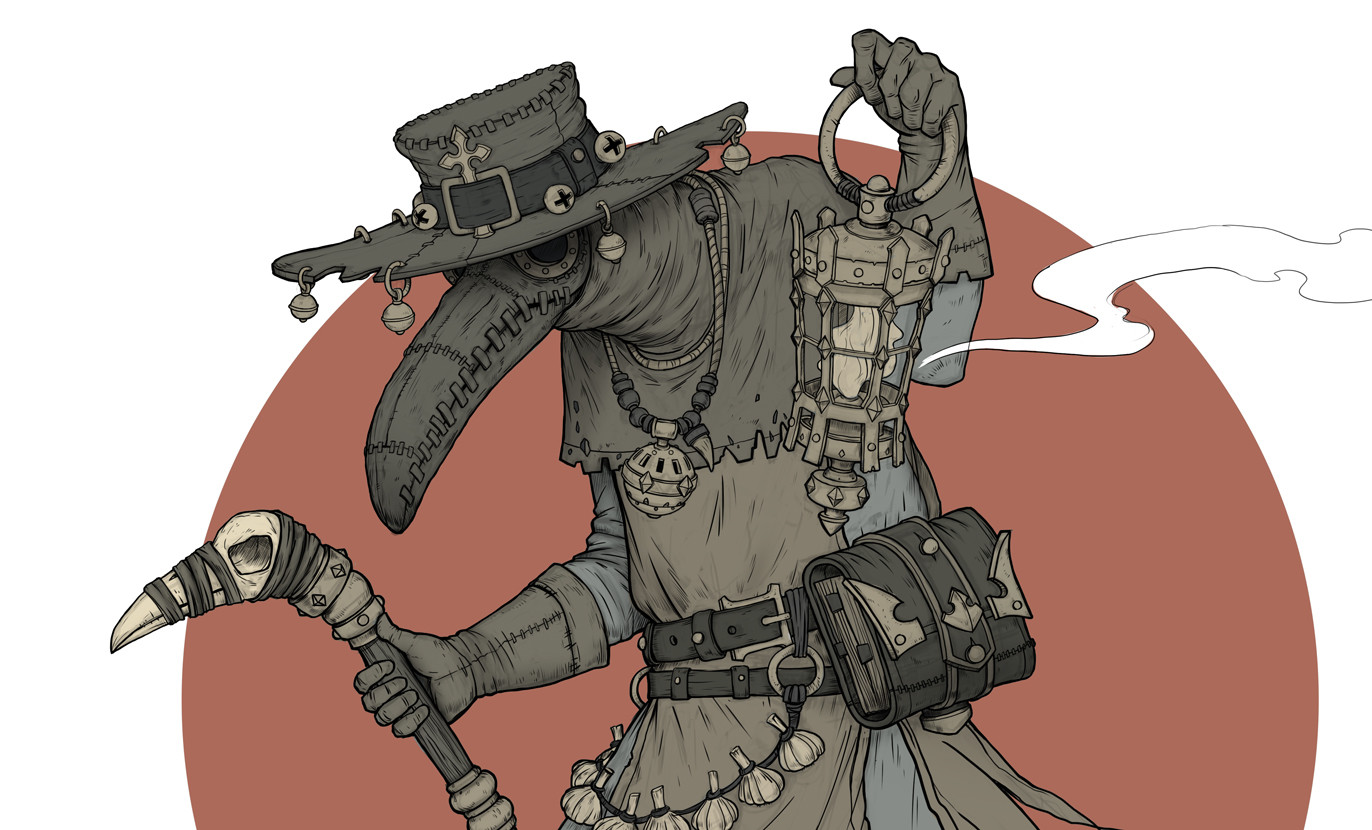 |
| Credit, Boris Rogozin |
Background
Skerples and Shadow of the Demon Lord have the right idea with skill checks. I'm going to be using character backgrounds/professions to indicate a PC's general knowledge and then use skills to provide Boons in specific situations where the skills apply, or just allow characters to pass.
Roll and gain the following background, then roll on the results underneath. Asterisks indicate that you are literate:
1. Academic*; 2. Criminal; 3. Frontier; 4. Soldier; 5. Urbanite; 6. Unusual
1. Academic*
1. You were studying to become a physician when you were discovered dissecting corpses in the mortuary. You were expelled and the scandal that followed tarnished your family's name. Start with the 'Anatomy' skill and a book of forbidden anatomical texts.
2. You attempted to link the physicians' study of the stars with the surgeons' cutting of the body. Your attempts to were violently resisted. Start with the 'Astronomy' skill and an extra 3 medical supplies.
3. Students are a rowdy lot. You patched up the worst of them after particularly intense debates or nights of drunken knife fighting, some of them paid you in lessons as well as coin. Start with the 'Literature' skill and an extra 1d10sp.
4. Capable assistants and understudies are always needed by wizards, especially those skilled with reagents and a needle & thread. Their survival rate varies wildly and the pay is usually not good enough. Start with a random magic wand and an Interesting Scar.
5. You supplemented your alchemical studies with surgery work on the side. Conveniently you had plenty of subjects to test your various concoctions on. For entirely unrelated reasons you now live anonymously very far away. Start with the 'Alchemy' skill and a vial of mutagenic compound (Save vs CON or suffer a random mutation).
6. A scholar of languages favoured your steady hands when they needed a haircut or bloodletting. Start knowing an extra language and with an extra 1gp.
2. Criminal
1. The gangs needed someone to patch them up, no questions asked. You did the job, though it gave you nightmares. Start with a bottle of strong spirit, 3 extra medical supplies and criminal contacts in the nearest town or city.
2. You procured bodies for illicit dissections in dark corners of the colleges. It paid well. Start with a shovel, the 'Graverobbing' skill and an extra 1gp.
3.* Thugs and rogues came to you for haircuts, tattoos and scarring. Your knives and needles were the best around. Start knowing the local Thieves' Cant and with a bottle of ink, a needle & thread and an extra 2d10cp.
4. You know how to really hurt people. How to hurt them so badly that they'll tell you where the money or somniferum is, with no falsehoods whatsoever. Start with the 'Torture' skill and a set of Specialist's Tools.
5. You tended to beggars and vagrants when everyone else ignored them. Increase your Stealth score by 2. There is a 2-in-6 chance that you know some of the beggars in a local settlement, roll when you first enter it; they will be wise to the goings on in town and can gather information unobtrusively.
6. You had the trust of a local crime boss, virtually acting as one of their entourage. A rival boss made you an offer you couldn't refuse and now your former employer's thugs are on the lookout for you. Start with the 'Disguise' skill, a hooded cloak and an extra 5gp.
3. Frontier
1. You had to learn how to deal with most things by yourself when wandering the forested frontier. Your talents rendered you invaluable to the isolated villages you passed through. Start with the 'Forestry' skill, a bow and 10 arrows.
2. For a time you lived as a recluse in a small mountain village. You earned a meagre upkeep through giving the occasional haircut and home-brewed tonic. Start with the 'Mountaineer' skill, 50' of rope and a thick cloak.
3. You travelled far and wide through the sparsely populated borderlands, honing your skills in hamlets, border towns and fortified castles. Start with a sturdy riding horse (with saddlebags) and an extra 3 days-worth of trail rations.
4. You drifted to-and-fro without aim, earning money and food where you could. You learned how to travel, scrounge and stay out of sight. Start with the 'Vagabond' skill and a well-worn cloak. You take 1 Boon to Saves against exposure or inclement weather.
5. As a ship's surgeon you were called on to treat the battle wounded and those who had fallen sick. More often than not you had no choice but to amputate limbs or extremities. Start with the 'Sailing' skill, a bucket of pitch and 50' of rope.
6. You eked out a living with a rough and ready band of thugs, waylaying travellers and shaking down local villages, until the War saw you dispersed. Start with the 'Banditry' skill, a sword and an extra 1d10sp in ill-gotten gains.
4. Soldier
1. You never fought in a battle but instead followed the army around as a camp follower, pulling teeth, providing medicines and trimming beards, among other things. The pay of a soldier is forever in arrears, so you often bartered your skills. Start with an axe, a small pig and a fine, red cloak.
2.* You attended to a lord while they fought in the War. Yours was a privileged position, but all this ended when they were killed or taken prisoner. Start with a sword, clothes in the livery of the lord you served and 1d6gp pilfered from their baggage when the news came through.
3. You fought in push of pike on the worst battlefields that the War had to offer, patching up your comrades as best you could. It was never enough. Start with light armour and +1 to Saves vs Fear.
4. Horses need just as much, if not more, looking after than people and you were often hired by members of a cavalry troop to help care for their mounts. Start with the 'Husbandry' skill, a set of horseshoes and a bag of fodder.
5.* The quartermaster kept access to you tightly restricted, meaning you had a lot of time to pore over records and receipts while waiting for those with the coin to buy your services. Start with the 'Logistics' skill and an extra 3 days-worth of pilfered ration supplies.
6. You made your services available to the locals as the army passed through. Most of them were dirt poor peasants with little in the way of coin. Start with a wheelbarrow, 3 turnips and 1d20cp.
5. Urbanite
1.* You mingled with burghers and high-ranking guild officials, eager for the trappings of wealth and power. Start with the 'Fashion' skill and a set of fine clothes.
2. Your city was besieged in the opening stages of the War and you were drafted to aid in its defence. Whether the city resisted or fell, you remember the experience vividly. Start with the 'Siege' skill and a polearm.
3.* You assisted a popular physician who, like all physicians, was above surgery. They pay was good but the constant condescension was too much, so you struck out on your own. Start with a book of medical texts and an extra 1d10sp.
4. You lived and plied your trade in the city's slums. You were poor but happy, even if you had to scrounge a lot of your supplies. Not so much now. Start with the 'Scavenge' skill, a memento of your home and take 1 Boon to Saves when resisting the effects of hunger.
5. Your services were used by numerous wealthy families in the city who wished their afflictions to remain anonymous. You were paid well and often travelled to and from their houses in secret. Start with the 'Disguise' skill, +1 Stealth and 1d6gp.
6. You were good friends with the watch, and often provided your services free of charge in exchange for certain favours such as turning a blind eye to a wagon or two. Start with the 'Smuggling' skill and 3 doses of somniferum.
6. Unusual
Discuss your background with the GM depending on the option you roll below:
1. You nearly died once. After that you always heard the whispers when you were working. They were even worse when a patient died on you. You can cast 'Speak with Dead' once per day as if it were a cantrip and take 1 Boon on Saves vs Fear.
2.* You hail from lands far beyond this one and its neighbours. The skills the local barber-surgeons display are crude and barbaric, but their reasoning is sound. Start with the 'Anatomy' skill. Your technique is such that you have a 25% to preserve any medical supplies used with your abilities. You know the language of your homeland.
3. As a child, you were blessed and marked by a saint when they passed through your village. You never got sick, even when the Plague swept through. Start with the 'Religion' skill and take 1 Boon on Saves vs Disease. You have an Interesting Scar.
4. You nearly died of fever as a child, and since you recovered you have always been able to see sickness and miasma. They hang over the afflicted like sickly ghosts weeping maggots. You always know when someone has been infected with a disease and gain 1 Boon when you Save vs Fear. You don't like cities and towns.
5. You've tried so many alchemical substances that it's rare you find one that affects you. Start with the 'Alchemy' skill. You gain 1 Boon when you Save vs poisons or other intoxicants, and must always Save even if someone friendly has administered the substance to you.
6.* You have been inducted in the histories of the physicians of old. Miraculous methods and techniques are within your reach. Nothing will stop you from obtaining them. Start with the 'History' skill, an ancient (and valuable) medical treatise and take +1 on Saves vs Fear.
Roll and gain the following background, then roll on the results underneath. Asterisks indicate that you are literate:
1. Academic*; 2. Criminal; 3. Frontier; 4. Soldier; 5. Urbanite; 6. Unusual
1. Academic*
1. You were studying to become a physician when you were discovered dissecting corpses in the mortuary. You were expelled and the scandal that followed tarnished your family's name. Start with the 'Anatomy' skill and a book of forbidden anatomical texts.
2. You attempted to link the physicians' study of the stars with the surgeons' cutting of the body. Your attempts to were violently resisted. Start with the 'Astronomy' skill and an extra 3 medical supplies.
3. Students are a rowdy lot. You patched up the worst of them after particularly intense debates or nights of drunken knife fighting, some of them paid you in lessons as well as coin. Start with the 'Literature' skill and an extra 1d10sp.
4. Capable assistants and understudies are always needed by wizards, especially those skilled with reagents and a needle & thread. Their survival rate varies wildly and the pay is usually not good enough. Start with a random magic wand and an Interesting Scar.
5. You supplemented your alchemical studies with surgery work on the side. Conveniently you had plenty of subjects to test your various concoctions on. For entirely unrelated reasons you now live anonymously very far away. Start with the 'Alchemy' skill and a vial of mutagenic compound (Save vs CON or suffer a random mutation).
6. A scholar of languages favoured your steady hands when they needed a haircut or bloodletting. Start knowing an extra language and with an extra 1gp.
2. Criminal
1. The gangs needed someone to patch them up, no questions asked. You did the job, though it gave you nightmares. Start with a bottle of strong spirit, 3 extra medical supplies and criminal contacts in the nearest town or city.
2. You procured bodies for illicit dissections in dark corners of the colleges. It paid well. Start with a shovel, the 'Graverobbing' skill and an extra 1gp.
3.* Thugs and rogues came to you for haircuts, tattoos and scarring. Your knives and needles were the best around. Start knowing the local Thieves' Cant and with a bottle of ink, a needle & thread and an extra 2d10cp.
4. You know how to really hurt people. How to hurt them so badly that they'll tell you where the money or somniferum is, with no falsehoods whatsoever. Start with the 'Torture' skill and a set of Specialist's Tools.
5. You tended to beggars and vagrants when everyone else ignored them. Increase your Stealth score by 2. There is a 2-in-6 chance that you know some of the beggars in a local settlement, roll when you first enter it; they will be wise to the goings on in town and can gather information unobtrusively.
6. You had the trust of a local crime boss, virtually acting as one of their entourage. A rival boss made you an offer you couldn't refuse and now your former employer's thugs are on the lookout for you. Start with the 'Disguise' skill, a hooded cloak and an extra 5gp.
3. Frontier
1. You had to learn how to deal with most things by yourself when wandering the forested frontier. Your talents rendered you invaluable to the isolated villages you passed through. Start with the 'Forestry' skill, a bow and 10 arrows.
2. For a time you lived as a recluse in a small mountain village. You earned a meagre upkeep through giving the occasional haircut and home-brewed tonic. Start with the 'Mountaineer' skill, 50' of rope and a thick cloak.
3. You travelled far and wide through the sparsely populated borderlands, honing your skills in hamlets, border towns and fortified castles. Start with a sturdy riding horse (with saddlebags) and an extra 3 days-worth of trail rations.
4. You drifted to-and-fro without aim, earning money and food where you could. You learned how to travel, scrounge and stay out of sight. Start with the 'Vagabond' skill and a well-worn cloak. You take 1 Boon to Saves against exposure or inclement weather.
5. As a ship's surgeon you were called on to treat the battle wounded and those who had fallen sick. More often than not you had no choice but to amputate limbs or extremities. Start with the 'Sailing' skill, a bucket of pitch and 50' of rope.
6. You eked out a living with a rough and ready band of thugs, waylaying travellers and shaking down local villages, until the War saw you dispersed. Start with the 'Banditry' skill, a sword and an extra 1d10sp in ill-gotten gains.
4. Soldier
1. You never fought in a battle but instead followed the army around as a camp follower, pulling teeth, providing medicines and trimming beards, among other things. The pay of a soldier is forever in arrears, so you often bartered your skills. Start with an axe, a small pig and a fine, red cloak.
2.* You attended to a lord while they fought in the War. Yours was a privileged position, but all this ended when they were killed or taken prisoner. Start with a sword, clothes in the livery of the lord you served and 1d6gp pilfered from their baggage when the news came through.
3. You fought in push of pike on the worst battlefields that the War had to offer, patching up your comrades as best you could. It was never enough. Start with light armour and +1 to Saves vs Fear.
4. Horses need just as much, if not more, looking after than people and you were often hired by members of a cavalry troop to help care for their mounts. Start with the 'Husbandry' skill, a set of horseshoes and a bag of fodder.
5.* The quartermaster kept access to you tightly restricted, meaning you had a lot of time to pore over records and receipts while waiting for those with the coin to buy your services. Start with the 'Logistics' skill and an extra 3 days-worth of pilfered ration supplies.
6. You made your services available to the locals as the army passed through. Most of them were dirt poor peasants with little in the way of coin. Start with a wheelbarrow, 3 turnips and 1d20cp.
5. Urbanite
1.* You mingled with burghers and high-ranking guild officials, eager for the trappings of wealth and power. Start with the 'Fashion' skill and a set of fine clothes.
2. Your city was besieged in the opening stages of the War and you were drafted to aid in its defence. Whether the city resisted or fell, you remember the experience vividly. Start with the 'Siege' skill and a polearm.
3.* You assisted a popular physician who, like all physicians, was above surgery. They pay was good but the constant condescension was too much, so you struck out on your own. Start with a book of medical texts and an extra 1d10sp.
4. You lived and plied your trade in the city's slums. You were poor but happy, even if you had to scrounge a lot of your supplies. Not so much now. Start with the 'Scavenge' skill, a memento of your home and take 1 Boon to Saves when resisting the effects of hunger.
5. Your services were used by numerous wealthy families in the city who wished their afflictions to remain anonymous. You were paid well and often travelled to and from their houses in secret. Start with the 'Disguise' skill, +1 Stealth and 1d6gp.
6. You were good friends with the watch, and often provided your services free of charge in exchange for certain favours such as turning a blind eye to a wagon or two. Start with the 'Smuggling' skill and 3 doses of somniferum.
6. Unusual
Discuss your background with the GM depending on the option you roll below:
1. You nearly died once. After that you always heard the whispers when you were working. They were even worse when a patient died on you. You can cast 'Speak with Dead' once per day as if it were a cantrip and take 1 Boon on Saves vs Fear.
2.* You hail from lands far beyond this one and its neighbours. The skills the local barber-surgeons display are crude and barbaric, but their reasoning is sound. Start with the 'Anatomy' skill. Your technique is such that you have a 25% to preserve any medical supplies used with your abilities. You know the language of your homeland.
3. As a child, you were blessed and marked by a saint when they passed through your village. You never got sick, even when the Plague swept through. Start with the 'Religion' skill and take 1 Boon on Saves vs Disease. You have an Interesting Scar.
4. You nearly died of fever as a child, and since you recovered you have always been able to see sickness and miasma. They hang over the afflicted like sickly ghosts weeping maggots. You always know when someone has been infected with a disease and gain 1 Boon when you Save vs Fear. You don't like cities and towns.
5. You've tried so many alchemical substances that it's rare you find one that affects you. Start with the 'Alchemy' skill. You gain 1 Boon when you Save vs poisons or other intoxicants, and must always Save even if someone friendly has administered the substance to you.
6.* You have been inducted in the histories of the physicians of old. Miraculous methods and techniques are within your reach. Nothing will stop you from obtaining them. Start with the 'History' skill, an ancient (and valuable) medical treatise and take +1 on Saves vs Fear.

